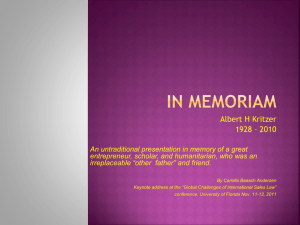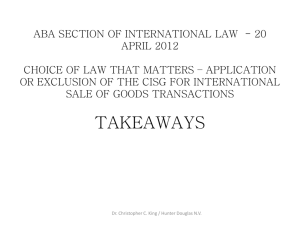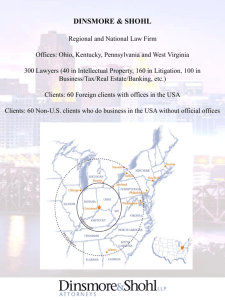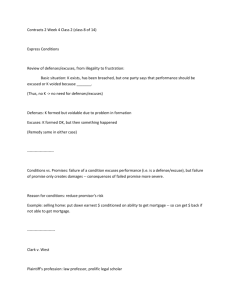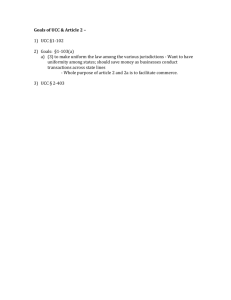Chapter 4 Sales Contracts
advertisement
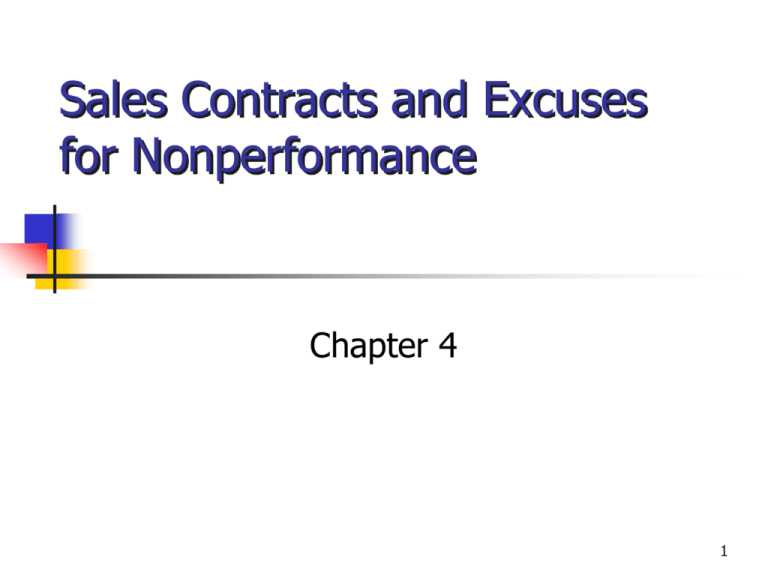
Sales Contracts and Excuses for Nonperformance Chapter 4 © 2002 West/Thomson Learning 1 The Role of the UCC in the US Art. 2 applies to transaction in goods Standardized sales law in 50 states with some individual state variation 2 International need for standardized sales law Response- CISG (UN Convention on Contracts for the International Sale of Goods) negotiated in 1980 became effective in 1988 Country differences in approach to contract law CISG a compromise; tries to keep parties in bargain 3 Choice of Laws Which law applies to the transaction? Parties may insert their choice of law in the contract to try to avoid the conflict of laws problem CISG allows parties to opt out 4 Applicability of CISG Commercial sale of goods Between parties whose places of business are in different countries The places of business are in countries that have ratified the CISG 74 countries have ratified 5 Asante Tech. Inc v. PMC Sierra (ND Cal 2000) Facts: A bought electronic parts from PMC – PMC office & factory in Canada A placed order through UT, distributor A’s contract forms said governed by state shown on buyers address PMC invoice said governed by law of Canada A claimed goods not up to specs – sued in Cal state court PMC removed case to federal court, A sought to send back to state court Issue: Does CISG apply? Does federal court have jurisdiction? Decision: CISG applies, federal court has concurrent jurisdiction Reasons: UT not agent, doesn’t establish PMC place of business Look to place of business with closest connection to contract – Canada Contracting parties from different countries that signed CISG PMC choice of law –Canadian law A choice of law – Cal – but federal CISG pre-empts state law Both Cal and Canada (BC) adopt CISG Federal and state courts both have jurisdiction – no need to remand to state court 6 Sales excluded from CISG Consumer goods Auction Stocks Vessels, aircraft, ships Contracts predominantly for labor or services No product liability for death or personal injury Parties to contract may opt out 7 Digital Signatures in e-Commerce U.S., Japan, China and the EU have statutes UN preparing a model electronic signature law 8 Comparison of UCC and CISG Writing Parole evidence Custom practice and trade usage Battle of the forms Disclaiming implied warranties Remedies for breach Specific performance This is only a partial list... 9 Must Contract be in Writing? UCC: contracts for the sale of goods $500 or more must be in writing to be enforceable However, there are many exceptions CISG: need not be in writing ( but Russia has elected writing requirement) China: UCL: need not be in writing 10 Parole Evidence UCC: If contract is final written expression, then parole evidence is not admissible to contradict Only resort to parole evidence if contract terms ambiguous CISG: Court may consider all relevant circumstances. Mcc Marble Ceramic v. Ceramica Nuova (p. 127) 11 Custom Practice and Trade Usage UCC: Allow past practice and industry practice to fill in the gaps. CISG: limited to those which parties agree to or past dealings or those usages that the parties ought to have known are observed in trade or industry 12 Battle of the Forms UCC: written confirmation is acceptance even though additional terms unless acceptance is conditional on assent Special rules for merchants: new terms become part of contract unless materially alter terms, or notifies of objection within reasonable time, or purchase order expressly limited to terms in order CISG:Acceptance containing new terms that do not materially alter becomes part of the contract unless there is a prompt objection If the terms materially alter then it is rejection of the offer and a counteroffer (not a contract without the new terms) 13 Solae, LLC v. Hershey Canada, Inc. (D.Del. 2008) Facts: S sold soy lecithin to H - negotiated annual contract for purchases for coming year Jan. 2006 – agreed H would order up to 250K lbs. @ $1.2526 per lb. June 06 – H faxed p.o. to S for 40K lbs. ; S sent order confirmation Sept. 06 – S ships to H, includes invoice setting conditions of sale, forum selection clause for Delaware courts Oct. 06 – H discovers goods contaminated – triggers recall, plant shutdown, govt. investigation H notifies S that it would hold S responsible; refused to accept or pay for further shipments S filed suit, H moves to dismiss – no personal jurisdiction Issue: Did contract include choice of forum clause? Decision: No – under CISG, choice of forum clause not part of contract Reasons: Art. 23 –contract concluded when acceptance of offer becomes effective – agt. Reached in Jan. 06 set goods, quantity and price – no forum selection clause 14 Solae, LLC v. Hershey Canada, Inc.(#2) Reasons: Art. 23 –contract concluded when acceptance of offer becomes effective – agt. reached in Jan. 06 set goods, quantity and price – no forum selection clause Art. 29 (1)– parties can modify contract Art. 19 – attempt to include additional terms for settlement of disputes is material alteration of terms of offer Failure to object to unilateral attempt to alter terms is not agreement to those terms No evidence that H agreed to modification of terms of 2006 contract Multiple invoices and pre-shipment confirmations do not modify contract to include forum selection clause 15 Disclaiming implied warranties UCC: seller may disclaim only by conspicuous words such as “as is” CISG: no limitations on ability to disclaim implied warranties 16 TeeVee Toons, Inc. v. Gerhard Schubert GMBH (S.D.N.Y. 2006) Facts: TVT and GS sign agreement – GS will build production system for Biobox System had severe malfunctions; TVT sued S for breach of warranty under CISG Art. 35 – seller obligated to provide goods as described by contract TVT – GS system not fit for particular purpose – production of Biobox TVT notified GS of nonconformity GS – terms of contract “T&C” disclaims Art. 35 warranties TVT – express oral understanding that T&C would not apply Issue: Are T&C excluded from contract? Decision: Refuse summary judgment – must hold trial Reasons: Art. 11 – contract need not be in writing; Art. 8 – consider evidence of parties’ subjective intent Statements by GS or TVT that contradict T&T or indicate T&C not part of contract must be considered Did parties intend that merger clause be effective Genuine issue of material fact as to whether parties intended to be bound by T&C If no shared intent to be bound by T&C, TVT can rely on 17 Art. 35 warranty Chicago Prime Packers v. Northam Food Trading Co. (N.D. Ill. 2004) Facts: CPP sold frozen pork ribs to N for $178K Ribs shipped to BPM – stored 3 times en route Ribs ultimately discovered to be spoiled – USDA condemned them NFT refused to pay, CPP sued for breach of contract Issue: Is NFT liable for damages for cost of ribs? Did NFT satisfy inspection and notification requirements of buyer under CISG? Decision: Yes – NFT liable for damages, didn’t meet burden of inspection Reasons: NFT has burden of proving ribs were nonconforming at time of receipt No inspection provision in contract; Art. 38(1) applies – inspect within as short a period as practicable Art. 38(3) – may defer examination until goods arrive at new destination – here, when ribs arrived at BPM No evidence that NFT or BPM could not have inspected when arrived at BPM NFT also failed to prove that it gave notice to CPP within reasonable time after it ought to have discovered nonconformity – Art. 39 When defect easy to discover by prompt examination, time of notice must be reduced NFT failed to examine ribs in as short a time period as practicable; therefore NFT also failed to give notice to CPP within reasonable 18 time Remedies for Breach Benefit of the bargain Place in position would have been had breach not occurred 19 Remedies for Breach Avoidance (Art. 49)- give notice (Art. 39) Seller’s right to cure if before performance due (importance of arrival date as well as shipment date) (Arts. 47 & 48) Price reduction (Art. 50) Money damages (Art. 74), Delchi Carrier case Cost of replacement goods (Art. 75) Duty to mitigate damages (Art. 77) Specific Performance (Art. 46) - limited use in U.S. (Art. 28), common under CISG 20 Remedies for Breach UCC: perfect tender rule (performance must match specifics of contract perfectly) CISG: buyer can avoid only if fundamental breach Buyer need not take delivery avoid the contract 21 Specific Performance UCC: available as remedy only under special circumstances (Goods unique and monetary damages not adequate) CISG: draws from civil law tradition Specific performance available Exemption for countries that do not have such a provision under their own law 22 Excuses for Performance Impossibility - supervening illegality Frustration of purpose (rare) Commercial impracticability CISG - impediments beyond control exemption Force majeure: unforeseen events beyond control of parties, act of God 23 Cases Asante Tech. v. PMC – Sierra, Inc. Solae, LLC v. Hershey Canada, Inc. TeeVee Toons, Inc. v. Gerhard Schubert GMBH Chicago Prime Packers, Inc. v. Northaqm Food Trading Co. Medical Mktg. Int. v. Int. Medico Scientifica Delchi Carrier v. Rotorex Corp. Harriscom Svenska v. Harris Corp. 24 Cultural Influence in Contract Negotiation Different styles of the pace of negotiating American style - immediately going into the business matters Asia: develop relationship first, then work on deal 25 Summary Contracts: bargain for performance What are each parties responsibilities? Bargain to allocate risk and price accordingly Contract needs to reflect agreement Contracts fix price and help to manage risk 26 Contract Law in China: Uniform Contract Law (1999) Individuals and foreigners can contract – generally without state permission UCL applies unless specific legislation or regulations apply Contracts valid when formed, even if required registration with government Contracts may be written or oral; recognizes electronic media 27 China: UCL (#2) Formation: contract requires offer and acceptance Offer: Shows intent to enter contract; specific and definite terms Acceptance: Shows intent to accept the offer; must accept terms of offer Consideration not required for valid contract Terms: should contain names & addresses, subject matter, quantity, quality, price, payment, performance deadline, liability for default, dispute resolution methods Contracts invalid if fraud, violates law, illegal purpose, harmful to state or 28 public interest China: UCL (#3) Performance: good faith performance required suspension of performance justifiable where: other party facing serious deterioration of business operation, has moved or withdrawn capital, has suffered a loss of commercial credit, or has experienced other circumstances showing a loss of ability to perform Modification: parties may modify by agreement 29 China: UCL (#4) Remedies: specific performance, remedial measures and compensation actual damages or liquidated damages consequential damages (lost profits) – amount of loss likely resulting from breach foreseen by breaching party at time contract made non-breaching party can demand specific performance unless would violate law Remedial measures include: repair, exchange, redo, return, and reduction of payment Non-breaching party has general duty to mitigate damages UCL recognizes force majeure: “any objective circumstance which is unforeseeable, unavoidable and insurmountable” 30
